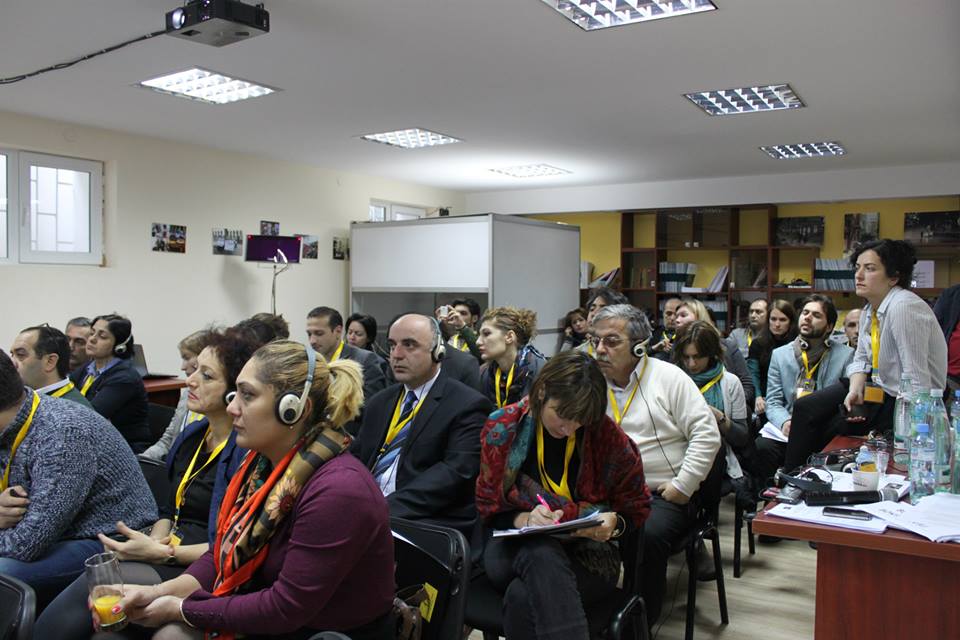The meeting of South Caucasus Network of Human Rights Defenders was a forum for those who are involved in human rights defenses in order to share ideas, challenges, advancement and updates on developments that influence their work as Human Rights defenders’ in each of the country. The meeting brought together Human Rights defenders from three countries: Armenia, Azerbaijan and Georgia.
Moreover, the meeting has evolved into one of the major forums for discussions among human rights defenders. The panel discussions include such topics as update on developments that influence their work as human rights defenders’ in each of the countries in South Caucasus or traditional (national) values against international human rights norms. Human Rights NGOs have presented how the concept of traditional (national) values is used to hinder their work.
Florian Irminger, Head of Advocacy and HRHF Geneva Office. Florian Irminger told about promotion of „tradition values“ in the UN as a means to undermine Human Rights. „Internationally there is an attempt to legitimize the violence against certain groups of people, the restriction of rights against some highlighting the importance of so-called “traditional values”.
Ekaterine Aghdgomelashvili from Womens’ Initiative Supporting Group in Georgia, told about situation with Gender and LGBT rights in Georgia: “With regard to the gender, sexuality and family issues, Georgia can be characterized as the country with deeply patriarchal culture, including the concepts of masculine and feminine. Despite the fact that modern reality is not appropriate with traditional views, which regulated the functions of man and woman in society, Georgian public perceptions are still traditional and public morality, which defines what is appropriate and what is inappropriate, evaluates reality in a traditional perspective.”
Lara Aharonian, Women Resource Center, presented campaign against Women’s groups/rights and WHRDs and told about Gender and human rights in Armenia. According to L. Aharonian, Armenian society does not understand Gender as value and right, Gender Equality Law is EU value and it intends to attack to the Armenian traditional family.”
Matanat Azizova, Women’s Crisis Center, Azerbaijan, told that Human Rights Defenders accused of not respecting Azerbaijani values: “In general, traditional values are provided on the negative side, they can be positive, but unfortunately they are used against vulnerable groups such as LGBT, women and others and if society wants, they can be used against men too.”
Furthermore, participants have discussed achievements and challenges of international advocacy in South Caucasus countries since February 2012. Artur Sakunts, coordinator of Helsinki Citizen Assembly Vanadzor have shared information about recent OSCE meeting of Human Rights Defenders in Istanbul.
Finally, there have been talking about UN Resolution on Human Rights Defenders and General Assembly Resolution on Women’s Rights Defenders. Participants have shared their ideas how to work and plans how to follow upon these Resolutions and in general how to strengthen and protect effectively South Caucasus Human Rights Defenders. Participants have discussed about priorities for their countries, what do they want to achieve and which tools will be effective to use for achieving the goals.
The South Caucasus Network of Human Rights Defenders unites 30 human rights NGOs in Armenia, Azerbaijan and Georgia. The Network was initiated in 2009 by the Human Rights Centre (HRIDC) Georgia in cooperation with the national coordinators in Armenia (Armenian Helsinki Association), Azerbaijan (Institute for Reporters´ Freedom and Safety) and the Human Rights House Foundation as an international partner. The Network seeks to facilitate creation of a safer and enabling environment for human rights defenders in the South Caucasus and to strengthen their voices in the region and internationally. Over 60 people have participated in this meeting.
Albina Nikitionok





